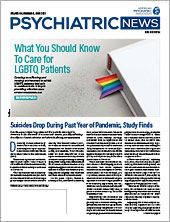Equity, and the fight for it, is a concept with which all psychiatrists are intimately familiar, said Michael Mensah, M.D., M.P.H. “Psychiatry has been marginalized as a specialty in medicine, and psychiatrists have been pushing for mental health equity for their patients for a very long time,” said Mensah. He is APA’s immediate past resident-fellow member trustee and a PGY-4 psychiatry resident and co-chief of the residency program at the Semel Institute of Neuroscience of the University of California, Los Angeles.
Yet, psychiatrists haven’t routinely talked about equity in the most urgent and important sense, Mensah said: racial equity. “Patients who have mental illness who are Black or Brown end up being even more marginalized than they may otherwise be,” he said. “A lot of patients are suffering, and if we want to be the psychiatrists we say we are, we need to center racial equity.”
It is not possible to be a passive observer within a racist system, or to simply declare oneself “not racist,” said Rahn Bailey, M.D., APA’s minority/underrepresented trustee, the assistant dean of clinical education at the Charles Drew University School of Medicine, and chief medical officer of the Kedren Community Health Systems in Los Angeles. To eradicate racism, in all its forms, everyone must embrace the concept of anti-racism. Anti-racism is proactive and assertive, he said. “It is taking an active stance against racism in every facet of your life and career.”
Mensah, Ruth Shim, M.D., M.P.H., and Lucy Ogbu-Nwobodo, M.D., M.S., wrote a report published January 12 in Psychiatric Services explaining that all policies and actions have consequences for racial equity. “By centering racial equity as the standard of anti-racism, the responsibility to pursue anti-racist action is not only applicable to individuals but also scalable to mental health institutions,” they wrote.
The authors listed some of the steps necessary for mental health professionals to center racial equity: increase awareness and acknowledge that racism exists everywhere, take an honest individual and institutional inventory, and apply a racial equity lens to mental health advocacy. Shim is the Luke and Grace Kim Professor in Cultural Psychiatry and a professor in the Department of Psychiatry and Behavioral Sciences at the University of California, Davis, and the co-author of Social (In)Justice and Mental Health from APA Publishing. Ogbu-Nwobodo is an APA/APAF SAMHSA Minority Fellow and PGY-3 psychiatry resident and incoming Massachusetts General Hospital administrative chief resident at the Harvard Massachusetts General Hospital/McLean Psychiatry Program.
“In medicine, we sometimes think that racial equity is not in our lane or our issue to tackle,” Ogbu-Nwobodo said. “But unless we all think of it as our duty as physicians to address these issues, they’re never going to be tackled. We all need to roll up our sleeves and get into the discomfort of this work.”
Acknowledging Racism and Sitting With the Discomfort
The first step to centering racial equity is starting the process of self-reflection and self-education, Ogbu-Nwobodo said. “It’s being willing to take an honest inventory of yourself, your role, and who you are in society,” she continued. “Acknowledge your privilege and the areas in your life where you can do better.”
“If you look for racism, you’ll find it everywhere. It’s like looking at the world through a new pair of glasses and realizing how impaired your vision has been all along,” said Jessica Isom, M.D., M.P.H., a psychiatrist at Codman Square Health Center and a voluntary faculty member at Yale School of Medicine. Isom emphasized that building awareness of racism is a skill that individuals must hone over time by committing themselves to doing so. “You have to make it a habit to see the world through this lens and learn to address it, especially when you’re working with patients.”
Ogbu-Nwobodo stressed that practicing anti-racism does not mean pointing moral blame or shame at some people. “There’s no utility in that,” she said. But she also emphasized that this work is not easy. “There’s nothing easy about dismantling a white supremacist system that has been set up to reinforce and boost some of our White colleagues,” she said. “It won’t feel good to try and dismantle a system that has been in place to protect you for so long.”
Acknowledging racism’s role both individually and within the field of psychiatry can lead to vastly better outcomes for patients. In their Psychiatric Services article, Mensah, Ogbu-Nwobodo, and Shim pointed out that “the false, racist narratives that exist about Black dangerousness and hostility” might skew the risk assessments that inform whether a patient requires seclusion or restraint. “Clinicians who are aware of the existence of racism will acknowledge that a lower threshold exists for seclusion and restraint for Black patients than for White patients,” the authors wrote.
Similarly, Ayala Danzig, M.D., M.S.W., pointed out that diagnoses within psychiatry are not equally distributed among populations. “Black males are more likely to be diagnosed with schizophrenia than White males with similar symptoms,” said Danzig, a fourth-year resident in the Yale University Department of Psychiatry, chair of the Assembly Committee of Resident-Fellow Members, and the Assembly’s Area 1 resident-fellow member representative. She regularly audits her own panel of patients, for example, to see if she is disproportionally diagnosing her Black patients with psychotic illnesses or if she’s prescribing more controlled substances to her White patients.
Psychiatrists must adopt anti-racist attitudes both within and outside of their clinical work, Bailey said. “An anti-racist agenda is one that is comprehensive and touches all aspects of our lives, and patients can see that,” he said.
Incorporating Anti-Racism Into Everyday Practice
There are many ways to bring anti-racist values into psychiatric practice, Mensah said. “Ask yourself: What does it look like for you to center anti-racism?” he said. “Does it mean introducing a sliding scale to help patients who can’t pay? Does it mean taking more Medicare and Medicaid patients than before? Does it mean taking a more active role in your local residency program to advocate for a more diverse residency class?” APA is a great resource, Mensah said. Staff can direct psychiatrists to anti-racism advocacy opportunities, and district branches may be able to help identify local anti-racism experts who can offer valuable insights. He encouraged psychiatrists to reach out to other experts to ask for guidance.
Last year, Isom founded Vision for Equity LLC, a consulting company made up of anti-racism coaches and trainers. She and her team are developing a diagnostic tool that they hope to roll out for individuals and organizations later this year. The tool allows participants to determine where they are on their journey to embracing anti-racism and offers interventions to help them along the way. “It’s hugely important to address structural racism, but organizations are made up of individuals,” Isom said. “We are all soaked in racism.”
The APA Task Force to Address Structural Racism Throughout Psychiatry has curated a list of resources of which psychiatrists can take advantage. Many of APA’s councils are also working on resource documents that provide practical suggestions about incorporating anti-racism into clinical practice.
APA’s Council on Children, Adolescents, and Their Families, for example, released a resource document that includes advice and instruction on discussing race and racism with patients and their families. It includes questions psychiatrists can ask to start conversations, such as if the patient has ever felt targeted or negatively treated due to his or her race or if the patient has ever treated someone else unkindly due to race.
Psychiatrists Play Major Role in Goal of Racial Justice
Ogbu-Nwobodo pointed out that, compared with other medical specialists, psychiatrists are uniquely equipped to take on the work of achieving racial equity.
In their article, Ogbu-Nwobodo, Mensah, and Shim explained that the associations between racism and mental health are stronger than those between racism and physical health. Further, psychiatrists have the skills necessary to stand against racism. “We need to leverage that opportunity and take the lead on this,” Ogbu-Nwobodo said.
“As a psychiatrist, patients come to me seeking direction and influence so they can feel empowered,” Bailey said. “If I don’t appreciate the culture in which they live and all the challenges they’re facing, I’m much less likely to be effective.” ■
“Racism and Mental Health Equity: History Repeating Itself” is posted
here.
“When Anti-Racism Becomes Trauma” is posted
here.
APA’s structural racism task force hub, including resources, is posted
here.
“How Psychiatrists Can Talk to Patients and Families About Race and Racism” is posted
here.


